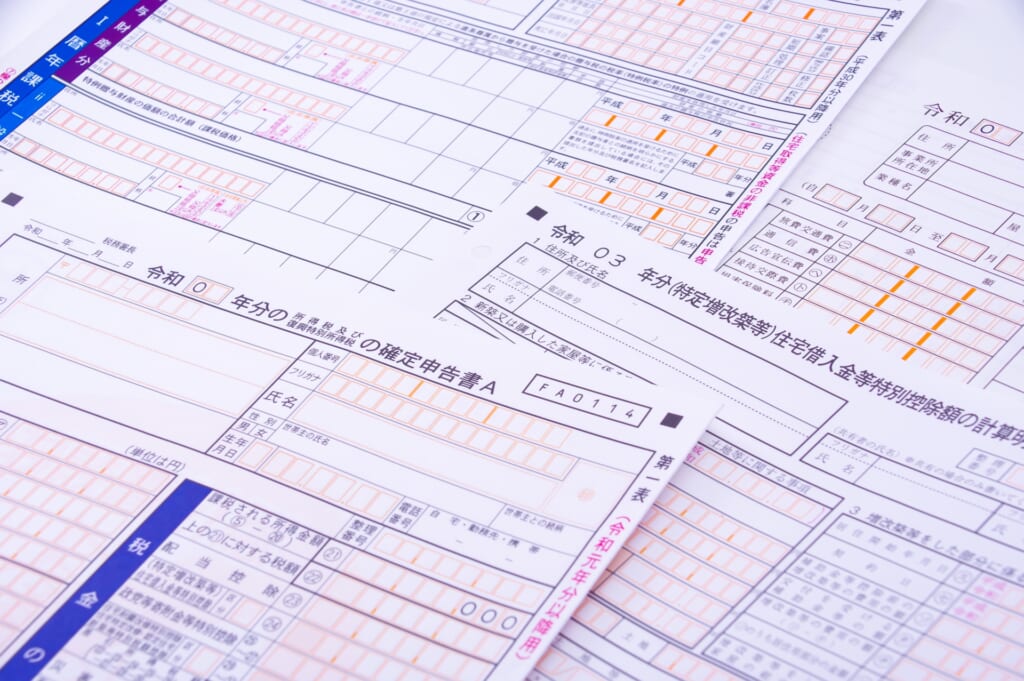Thorough Guide to the Japanese Tax System 2024
Complete Explanation About Japan’s Taxes

This is a complete guide to Japan’s tax reforms starting from 2024, aimed at those seeking accurate information about taxes. The Japanese tax system is complex and provides critical information for sole proprietors, freelancers, and corporate accountants. The reforms planned for 2024 are expected to introduce new rules and regulations concerning taxes, potentially affecting business and investment both domestically and internationally. This explanation will highlight Japanese tax declarations, tax saving measures and specific points on Japan’s tax reforms.
Basic Overview of Japanese Taxes
Japan’s taxes include various types such as income tax, consumption tax, and corporate tax. First, regarding income tax, it is levied on individuals’ income, including salaried workers and sole proprietors. Next, consumption tax, which was raised to 10% in 2019, is applied to various goods and services. Corporate tax is levied on the profits earned by corporations, vital for company accountants.
When calculating taxes, there are various deductions and exceptions available. For example, income tax includes deductions such as mortgage interest and medical expenses. Likewise, corporate tax offers various depreciation and reserves exceptions. Understanding the basics of taxes allows for easier tax planning for individuals and businesses.
Japan’s Tax Rates and Types
Japan has various tax rates, each applying to different types of taxes. First, let’s look at income tax rates. Income tax adopts a progressive tax system where higher income attracts higher tax rates. As of 2024, the highest rate is 45%, which increases incrementally as income exceeds certain amounts.
Next, regarding consumption tax, the current rate is 10%, but reduced rates apply to certain food products and books, making it 8%.
Corporate tax rates also vary based on income. As of 2024, corporate tax rates range from 15% to 23.2%. Additionally, special tax regimes apply to small and medium-sized enterprises.
Thus, Japan’s tax rates vary for income tax, consumption tax, and corporate tax, each with its tax regime. Changes to tax rates or tax systems and their effects make regular information gathering essential.
What is a Resident Tax?
Resident tax is a local tax paid by individuals and corporations residing within Japan. It is levied according to income and differs from national taxes. Specifically, it includes ‘income split’ for individuals such as salaried workers and self-employed persons, and ‘corporate citizen tax’ for corporate income. Resident tax revenue is primarily used by local municipalities and prefectures for welfare and infrastructure. Understanding the deadlines, calculation methods, and exceptions of resident tax is crucial for fulfilling individual and corporate tax obligations.

The Mechanism of Income Tax
The mechanism of income tax refers to the system of taxing income earned by individuals. This includes salary income, business income, real estate income, etc. Income tax calculations apply rates based on the amount of income. The tax rate increases with higher income due to the progressive system and can change annually. When calculating income tax, various procedures and systems such as withholding at source, blue return, and final tax return exist. Utilizing deductions and tax-saving measures can reduce the actual tax payable. It’s also crucial to understand the deadlines for submitting tax returns and making payments to avoid troubles related to personal taxes. Understanding and appropriately filing and paying income tax helps avoid personal tax issues.
Focus on Individual Taxes
With the 2024 tax reform, what changes can be expected in individual taxes? First, let’s focus on income tax. The new tax system is expected to revise income tax rates and deduction amounts. For instance, income tax saving measures might be revised, and the obligation to submit proof of income might change. Resident tax also warrants attention as changes in taxable objects and rates are expected. Additionally, revisions to tax incentives might alter various deductions and exceptions. From these perspectives, a different tax system may be introduced, making information gathering crucial for adapting to upcoming changes.
Tax Information Salarymen Should Know
What important tax information should salarymen know? First, the handling of taxes on salary income. Income tax and resident tax are deducted from monthly salaries through withholding, with the amounts adjusted at year-end. Using deductions like salary income deduction and specific expense deduction can reduce taxes payable. Additionally, final tax returns might be necessary depending on annual income and expenses. Utilizing deductions like the salary earners’ deduction, special spouse deduction, and special deduction for home loans offers tax-saving benefits. It’s also essential to use schemes like iDeCo and NISA for retirement savings.
Furthermore, proper tax handling is also required for other take-home income and side jobs. For example, if income from side jobs exceeds a certain amount, a final tax return is necessary. Attention is also needed during year-end adjustments for applying spouse dependents’ deduction and changing deduction amounts. For salarymen, understanding and utilizing this tax information leads to wise money management.
Tax Calculations for Freelancers and Sole Proprietors
For freelancers and sole proprietors, tax calculation is a crucial element. First, start with calculating the income amount, which is income minus necessary expenses. Necessary expenses include costs essential for business and earning income. Next, calculations for income tax and resident tax are needed. Income tax is calculated based on applicable rates to the income amount. Resident tax varies depending on income and residence area, so checking local government rules is necessary. Additionally, calculations for pension and health insurance premiums should not be overlooked.
These premiums are based on the income amount, requiring accurate calculations. Lastly, understanding the methods and deadlines for final tax returns is essential. Accurate tax calculation and declaration are crucial for fulfilling tax obligations and maintaining healthy business operations.
Basics of Inheritance and Gift Taxes
Let’s grasp the basics of inheritance and gift taxes as part of the tax reforms aimed at 2024. Inheritance tax applies when inheriting assets from a deceased person, while gift tax applies when transferring assets during one’s lifetime. Taxable objects for inheritance tax include land, buildings, savings, and securities. Gift tax applies to real estate, cash, and stocks. Tax rates and deductions for inheritance and gift taxes might change with the reforms. Additionally, tax-saving and inheritance planning are important points. These tax reforms could change the handling of taxes on inheritance and gifts, making information gathering essential for future preparations.
About Tax Declarations and Payments

Tax declarations and payments are crucial annual procedures for individuals and corporations. First, tax declarations like income tax and corporate tax involve declaring income or profits and fulfilling tax obligations. Typically, declarations and payments are made during the tax filing season using electronic declarations and payment forms. Preparing various documents and financial details is essential for creating and submitting tax forms. Penalties exist for omissions or incorrect declarations, necessitating accurate and appropriate actions to avoid issues with tax authorities.
Furthermore, adhering to detailed payment schedules and procedures is crucial for tax payments. Missing payment deadlines can lead to additional interest or penalties, requiring attention. Also, appropriate withholding and consumption tax payments necessitate preparation of tax declarations and payment plans. Receiving advice from experts while managing proper schedules and procedures is essential for tax declarations and payments.
Methods and Deadlines for Income Tax Declaration
Methods and deadlines for income tax declaration
Income tax declarations include final tax return and blue return systems. The final tax return system allows individuals with certain income or assets to directly pay taxes based on the Income Tax Law. On the other hand, the blue return system applies to specific non-profit business income, agricultural income, forestry income, and fishing income.
The deadline for income tax declarations is typically March 15th. Missing this deadline can lead to penalties, so it’s important to adhere to it. Preparing various documents, including income details and withholding certificates, is necessary for the final tax return. For blue returns, additional non-taxable methods apply or specific conditions need to be met.
Methods for income tax declarations include e-Tax, tax representative declarations through accountants or tax offices, and downloadable declarations from the tax agency. Obtaining accurate information about each declaration method and its procedures is important.
Methods for Paying Resident Tax
Methods for paying resident tax vary by city or town. Resident tax is calculated based on annual income, with defined payment deadlines and methods.
Typically, payment slips are sent, and payments are made through transfers or at post offices. Direct payments or account transfers are also options, but adhering to deadlines and proper procedures is crucial.
Tips for Saving on Taxes
To save on taxes, various methods and approaches are available. First, planning for appropriate tax savings is crucial. Detailed expense tracking and proper declarations can reduce unnecessary expenditures. Additionally, obtaining accurate knowledge about tax-saving systems and laws is important. Actively gathering information and seeking expert advice allows for considering tax-saving ideas and strategies. Furthermore, appropriate investments and asset management can provide tax-saving benefits. However, complying with legal regulations during tax-saving processes is crucial.

Selecting the right methods while adhering to legal standards is essential for saving on taxes. Various tips for tax savings exist, but planning according to individual situations and needs is the most effective approach.
Tax Saving Measures and Legal Tax Saving Techniques
To save on taxes, accurate understanding and information gathering are essential. Specific tax saving measures include appropriate management and declaration of expenses. Clearly identifying expenses related to business activities and properly accounting for necessary expenses can save on taxes. Additionally, as tax saving measures, appropriate management of investments and assets is effective. Considering appropriate investment targets and asset allocation can save taxes and also contribute to future asset formation.
As for legal tax saving techniques, it’s important to utilize methods based on tax laws and systems. For example, using tax-favored measures recognized by tax law allows for legally saving on taxes. However, selecting tax saving methods with compliance and risk avoidance in mind is crucial. Also, receiving advice from experts helps devise appropriate tax saving strategies. While utilizing legal tax saving techniques, consider specific measures to save on taxes.
Creating a Family-Friendly Tax Plan
When devising a tax plan, taking a family-friendly approach is important. First, keep a household budget to track income and expenses. Understanding specific figures allows for detailed confirmation of finances. Next, properly identifying expenses and revising necessary expenses for tax savings is crucial. Additionally, utilizing tax deductions and favorable systems to create a family-friendly plan is important, especially for households with children or mortgages. Also, considering future life plans, such as education and retirement funds, is essential when planning for taxes. Tax planning is a key step in establishing a financial foundation for households, and receiving expert advice while creating a family-friendly plan is crucial.
Commonly Asked Questions and Answers About Taxes
For those with doubts or questions about taxes, commonly asked questions and their answers are summarized below.
When is the deadline for income tax declaration?
Generally, the deadline for income tax final declarations is March 15th annually, but it can change depending on the year, so checking the latest information is recommended.
What is year-end adjustment?
Year-end adjustment is a procedure where salaried workers declare and pay income tax and resident tax in advance at year-end. It is usually conducted by the employer.
What documents are needed for final tax declarations?
Final tax declarations require documents such as withholding certificates, pay slips, medical expense receipts, and donation receipts. Other documents related to specific expenses may also be necessary.
Thus, answers to common tax-related questions are introduced here. This provides an opportunity to deepen understanding of one’s tax affairs based on accurate information.
Summary
As said in the introduction, the 2024 tax reforms in Japan are expected to involve various regulatory changes related to individuals, corporations, and consumption taxes. It could impact business expansions and investments both domestically and internationally. Especially for foreign companies considering business expansions in Japan, attention to these tax reforms is necessary. To minimize the effects of tax reforms, it’s crucial for businesses and sole proprietors operating in Japan to regularly catch up on information regarding tax reforms.
